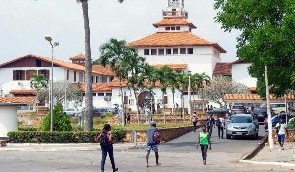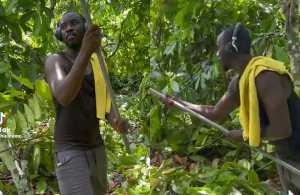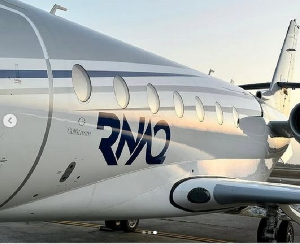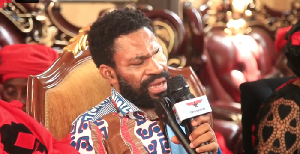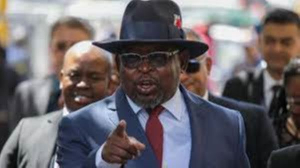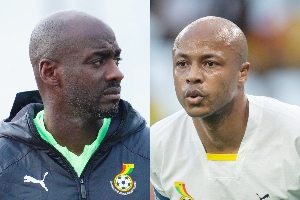Folks, it was such a quite Sunday, sitting in front of my pc surfing through my favourite www sites and enjoying my favourite internet radio. Then, suddenly, something occurred in my mind to do something much more patriotic. In any case, to contribute something to the ongoing democratic dispensation in our dear country in the way I usually do ? that is to say, share patriotic thoughts with all concerned and reading public out there. The topic selling hot in the information market about Ghana is the impending December 7 presidential and parliamentary elections. I don?t live in Ghana but I follow every bit of the activities leading to this D-date. By writing, I get some sense of partaking in this very crucial event destined to shape the course of democracy in our dear country.
I have been glad about the campaign strategies and debates of all the political players in the country. It?s great to acknowledge that The Ghana Centre for Democratic Development (CDD-Ghana) and the Coalition of Domestic Election Observers (CODEO) and other non-political organizations are adding more credibility to our country?s seriousness towards democracy. I have always wished them well and at the same time urge them to remain neutral for their credibility to grow and progress. We need them, don?t we?
I was relieved just like many of you probably did when the vice-presidential running mate issues were peacefully settled for particularly the two major political parties ? the ruling National Patriotic Party and the National Democratic Congress. I was not happy though that the NDC pushed aside the candidate many thought to be preferable, Hon. John D. Mahama (the party?s communication spokesman and honourable MP for Bole) based basically upon his religious affiliation. It?s a different set of political debate and I will leave that here for now. However, it was a plus for our democracy that the selection of running mates went without drama for both parties.
My main intention today is to dwell on how I see the public is being wooed to take sides in the scramble for the presidency, seats in our august House and to form the next govt. The incumbent NPP, as expected, is selling itself mostly by making references to what they have achieved since getting the mandate in 2001. The disbursement of millions in Hipc profits across the country dominates their campaign message. Undoubtedly, rightly so. As friends and family in Ghana usually put it, there is nowhere in the country that one will go and will not feel the impact of the hipc millions. The NPP?s vision for another 4-year term is to simply continue the good works they have achieved so. It?s no surprise that their manifesto for the election is 'Positive Change-The Next Phase". This is reflected in the President?s exhortation to the Ghanaian electorate not to overlook the great achievements made by his government since 2001 and return the Party to power to enable it continue with the positive change it had brought into the economy and other sectors. Like many people, I think they have an easier message to sell than their opponents.
In addition to the HIPC millions, there are many other good things associated with the NPP government. President J. A Kufuor?s gentle giant philosophy is one area that has won him much credibility and the hearts of many Ghanaians and others across the global community. Within his short stay as president, President J. A. Kufuor has built an image of a father who cares for his children and who has the heart to tolerate all manners of behaviour. This has fetched him much credibility and has given rise to the term ?skirt-and-blouse? in our political discourses. This simply means that there are many Ghanaian electorates who have no problem voting for the President but the same cannot be said about the parliamentary candidates including those vying for his party. In many circles, it seems to be a foregone conclusion that the president deserves a second term and will surely get it. His record on human rights, rule of law and statesmanship is unmatched in the recent history of the country. His role as the head of ECOWAS is another area he has scored a high mark. In a nutshell, the president?s record seems unblemished and seems to have all the good recipes for a second mandate, at least, as seen and being sold by the Party?s leadership and supporters.
The NDC, on the other hand, has clearly the hardest task ahead. The question still remains how they are going to convince Ghanaians that they now have the solutions to the country?s many problems. It must be reminded that less than four year?s ago, the NDC lost the grip on the presidency, after the then President J. J. Rawlings, had ruled for 19-uniterrupted years. If memory serves us right, the Party?s loss was not for nothing. They were ousted because it was clearly a government that had visibly lost vision, was corrupt, intimidating and exhausted by all counts. In the NDC?s recently publicised manifesto, Ghanaians are being promised improvements in their lives within the shortest possible time should they be given the mandate come December. The most arduous task for the NDC is how to convince Ghanaians that they are reformed and will not give history any chance to repeat itself. It?s evident in their campaign sermons that they are disturbed (if not haunted) by their past. It is therefore common to hear statements and titles that seem to portray a new NDC. It doesn?t surprise many of us that the Party?s flag-bearer, Professor J. A. Mills, bears the title Asomdwiehene (peacemaker). The question remains to be seen if that is enough to convince the Ghanaian electorates to put their hopes and aspirations on him and his National Democratic Congress.
Nevertheless, the NDC cannot be ruled out as a lost case. At least, I refuse to do that. The 19-year rule of Rawlings (the NDC founder and godfather) cannot be washed away so easily within a 4-year period by the NPP incumbency. The retired flight lieutenant and former dictator of Ghana continues to enjoy huge popularity that makes his party a match in Ghanaian politics. The problem with Mr. Rawlings though is his defiant and disrespectful attitude towards the NPP government in general and President J. A. Kufuor in particular. His criticisms against the government have been very embarrassing and misguided. However, that has been his style since entering the political scene in 1979. He is on record for staging two successful and bloody coup d?etats and slapping his own vice president. It as such seems not to be difficult for Ghanaians to understand where his temperament is coming from. The Kufuor-Mahama leadership has so far given him an opportunity to be himself and to feel the democracy more than any other citizen. The issue therefore is whether the Ghanaian electorate has reasons to take him serious or not, and is up to the individual to decide ? after all we live in a democracy.
The NDC campaign has tried to find a stigma that will destabilize the government?s many sources of strength. It?s therefore not a surprise that the barbaric assassination of Ya-Naa Yakubu Andani II, Paramount Chief Dagbon and 30 others is among the key pillars in the NDC campaign. It?s one topic that doesn?t fit well into our democracy and arouse ill feelings and tempers whenever it?s mentioned. It?s an issue many Ghanaians don?t want to be dragged into mainstream partisan politicking since that frustrates efforts to find justice for the late Chief and the good people of Dagbon. Sadly, the NDC consider it a fertile ground for votes and leaving no stone unturned to blame the government for this tragic event. What they don?t seem to have done is articulating their views on why that was Kufuor?s government policy to assassinate the great Dagbon overlord.
It will probably be dishonest on my part or anyone?s to argue that Ghanaians have become better off today than in the past. There is ample evidence to suggest that life continues to be a struggle for majority of Ghanaians. However, like many Ghanaians, I do not allow myself to be easily deceived by the poor economic conditions to downplay the gains of the National Patriotic Party government since 2001. The genuine investigative questions that keep banking many thoughts are how the situation would have been today without the change in 2000, if the cedi had continued the free fall against the major world currencies, if the galloping inflation before 2001 had not been tamed, if the killer interest rates had remained, if the high crime rate had continued, if the political harassment and intimidation had continued, if debt servicing had continued to be at the same level, among others. The situation, according to a friend, would certainly have been much more precarious than we are witnessing today ? which many Ghanaians tend to agree.
The NPP?s positive change is real but we certainly have a long way to go. However, it?s a strong belief among Ghanaians that a second term for Kufuor-Mahama and the NPP will mark the beginning of the march towards the strengthening of individual pockets and living conditions. This assertion remains contentious and to be seen.



